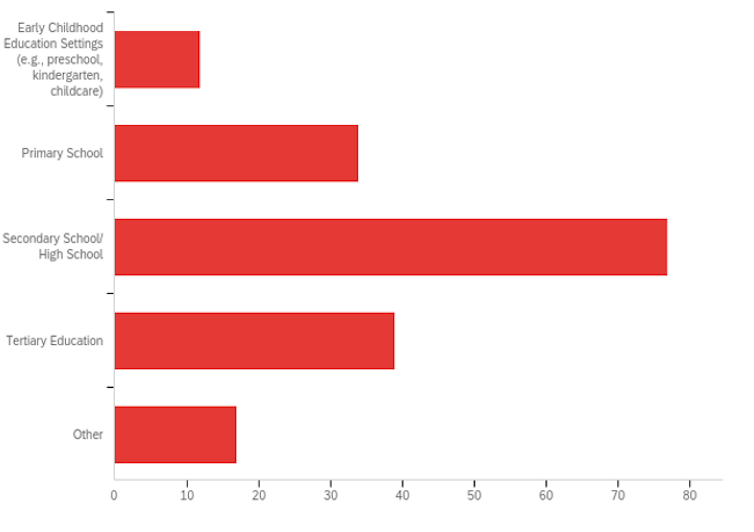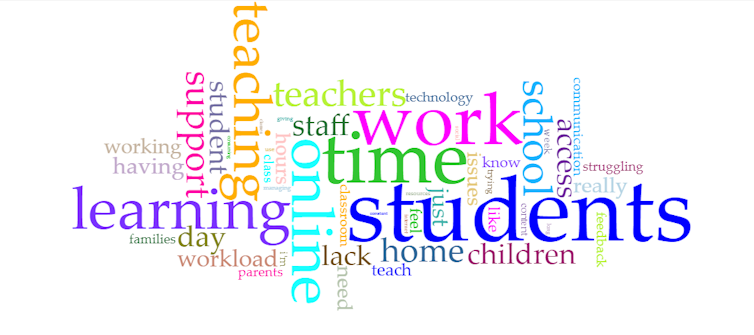Source: The Conversation (Au and NZ) – By Louise Phillips, Associate Professor in Education, James Cook University
All Victorian school students will be learning remotely from Wednesday. Prior to the state’s premier Daniel Andrews announcing a tightening of restrictions over the weekend, only students in prep to Year 10 in Melbourne and the Mitchell Shire were learning from home.
But on Wednesday, schools will close for Year 11 and 12 students in Melbourne and the Mitchell Shire, as well as every student across Victoria — except for students in special schools and children of essential workers.
Like with the last remote learning period in Australia, the current uncertainty in Victoria might cause disarray and stress among teachers, parents and students.
In response to the closures in April, with seven other researchers across Australia, New Zealand, Singapore and the US, we designed a survey that asked teachers 16 open-ended questions about how COVID-19 affected them and their students.
The teachers ranged from early childhood education through to school and university. We also included other educators, such as at museums.
The survey opened on May 4, 2020 while most countries in the survey engaged in home-based learning. There have been 621 responses to date. Of these, 179 are from Australian teachers, with 65% having over 21 years teaching experience, from which this article reports.

Our survey gained rich responses about the sudden closure of schools, transition to online learning, and the difficulties of negotiating social-distancing and increased hygiene maintenance.
Relentless workload
When asked, “How has COVID-19 impacted your teaching and learning?”, responses most commonly referred to technical issues, then the pragmatics of teaching and workload.
Overwhelmingly, teachers from early childhood to higher education experienced a significant increase in their workload. One teacher said the sudden change to online learning created “endless paperwork and programming issues” and “has been relentless”.
Another said
It’s definitely added significantly to my workload and taken the holiday time that would normally provide some respite, meaning I am closer to burnout than ever.
Social distancing requirements also increased teachers’ workload, creating “lots of additional cleaning requirements and having to collect children from the carpark as families are not allowed to enter”.
One teacher said
It is draining. Exhausting. Time consuming. The work never stops.
‘I don’t want to teach anymore’
The impact on the mental and physical health of teachers was the next most frequently expressed — after the technical, pragmatic and workload issues.
One teacher told us:
I struggle to sleep at night for thinking about work all the time. I’m very stressed and anxious; my physical health has been impacted.
Another said:
It has challenged everything I enjoy about teaching.
And another wrote:
All the teachers I work with are EXHAUSTED beyond measure.
Teachers said a lack of voice and agency in decision making made them feel “unmotivated” or “unvalued”.
(we) may have felt more supported had we been consulted and listened to by management and government.
One teacher wrote:
In the beginning, I felt I could have dropped dead at home and my workplace wouldn’t even notice.
Another said:
Going through this, not feeling safe, and then seeing teachers belittled in the media, has made me come to the realisation that I don’t want to teach anymore.
‘It was a scramble’
When asked, “What are the issues you are struggling with and need support with?” some teachers mentioned the management and decision-making concerning school closures.
The word cloud below shows the most frequent words in response to the question.

One teacher said:
Our school closed down at the end of term one. It was a scramble and our management made some decisions which made life harder for teachers.
One early childhood and childcare teacher said:
The government has largely ignored the realities of EC [early childhood] environments, the impossibility of social distancing with children under five, and the fact we have high exposure to bodily fluids.
But the most frequently mentioned struggle for teachers in Australia was maintaining quality in pedagogy and curriculum delivery. Teachers are worried the quality of education might be compromised during this uncertain time.
One teacher said:
We are in social repair time. And you know what — no one cares what we are doing in our rooms — just get through ‘til term’s end.
The teachers named student disengagement, uncompleted work and the disparity of access to online materials as the key challenges to quality.
The second most frequent struggle was insufficient time to attend to teaching and learning demands. Many reported working 60% to three times more hours than they were contracted and paid. The sudden shift to online required teachers to self manage production and delivery of online teaching and learning materials, without adequate training and resourcing.
In the longer term, this sudden change in education may lead us to think of innovation in the area. But for now, teachers, schools and students are just trying to survive, and they need all the resources necessary to make it through this year — and beyond.
– ref. ‘Exhausted beyond measure’: what teachers are saying about COVID-19 and the disruption to education – https://theconversation.com/exhausted-beyond-measure-what-teachers-are-saying-about-covid-19-and-the-disruption-to-education-143601







